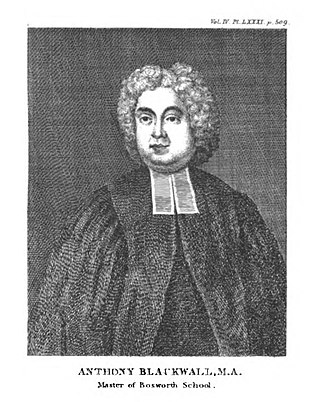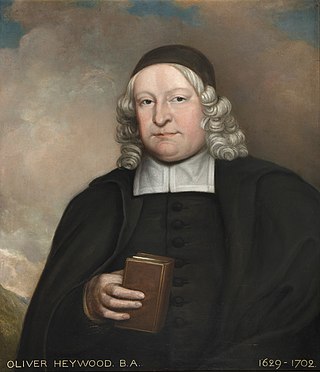Related Research Articles

John Taylor (1694–1761) was an English dissenting preacher, Hebrew scholar, and theologian.

Morley is a village and civil parish within the Borough of Erewash in Derbyshire, England.

Philip Henry was an English Nonconformist clergyman and diarist. His son Matthew Henry was a notable commentator on the Bible and also a Presbyterian minister.

Anthony Blackwall, was an English classical scholar and schoolmaster.

Francis Tallents (1619–1708) was a non-conforming English Presbyterian clergyman.
William Bagshaw or Bagshall (1628–1702) was an English presbyterian and nonconformist minister, known as the "Apostle of the Peak".

Oliver Heywood (1630–1702) was a British nonconformist minister, ejected for his beliefs.

Richard Frankland (1630–1698) was an English nonconformist, notable for founding the Rathmell Academy, a dissenting academy in the north of England.
Stephen Lobb was an English nonconformist minister and controversialist. He was prominent in the 1680s as a court representative of the Independents to James II, and in the 1690s in polemics between the Presbyterian and Independent groups of nonconformists. His church in Fetter Lane, London is supposed to be the successor to the congregation of Thomas Goodwin; he was the successor to Thankful Owen as pastor, and preached in tandem with Thomas Goodwin the younger.
Obadiah Grew was an English nonconformist minister.
Thomas Blake (1597?–1657) was an English Puritan clergyman and controversialist of moderate Presbyterian sympathies. He worked in Tamworth, Staffordshire and in Shrewsbury, from which he was ejected over the Engagement controversy. He disputed in print with Richard Baxter over admission to baptism and the Lords Supper.
Henry Denne was a Church of England clergyman and controversialist, later a prominent General Baptist.
Roger Laurence (1670–1736) was an English nonjuring priest and controversialist.
John Bryan, D.D., was an English clergyman, an ejected minister of 1662.
Samuel Bury (1663–1730) was an English Presbyterian minister.
Henry Finch (1633–1704) was an English ejected minister.

Samuel Shaw (1635–1696) was an English nonconformist minister.
Caleb Fleming, D.D. was an English dissenting minister and polemicist.
Julines Herring (1582–1644/5) was a Puritan clergyman within the Church of England who served in Derbyshire and at Shrewsbury. Ejected from his positions for nonconformity, he became a minister serving the English-speaking community in the Netherlands. He was a staunch proponent of Presbyterianism and an opponent of separatism.
Samuel Cradock, B.D. (1621?–1706) was a nonconformist tutor, who was born about 1621. He was an elder brother of Zachary Cradock.
References
- ↑ B. Tacchella, ed., The Derby School register, 1570–1901 (1902), p. 8
- ↑ "Cantrell, Henry (CNTL701H)". A Cambridge Alumni Database. University of Cambridge.
- 1 2 3 4 5 6 7 8 9 10 Cantrell, Henry, Church of England clergyman and religious controversialist by David L. Wykes in Dictionary of National Biography (OUP, 2004)
- ↑ Vestry book, St Alkmund's parish, Derby, 1698–1783, Derbyshire Record Office, accession D916A/PV 1/1
- ↑ St Alkmund's register, 5 November 1712
- ↑ British Library, MS Stowe 119, folio 76v
- ↑ A History of Derby by William Hutton (1791)
- ↑ L. Eardley-Smith, Derby and the forty-five (1933), p. 14
- ↑ H. Cantrell, commonplace book, Derbyshire Record Office, accession D916A/PI 69